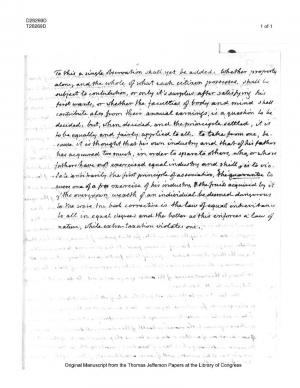Extract from Thomas Jefferson’s Addition to Note for Destutt de Tracy’s Treatise on Political Economy
| [ca. 18 May 1816] |
To this a single observation shall yet be added. Whether property alone, and the whole of what each citizen possesses, shall be subject to contribution, or only it’s surplus after satisfying his first wants, or whether the faculties of body and mind shall contribute also from their annual earnings, is a question to be decided. but, when decided, and the principle settled, it is to be equally and fairly applied to all. to take from one, because it is thought that his own industry and that of his father[s?] has acquired too much, in order to spare to others, who, or whose fathers have not exercised equal industry and skill, is to violate arbitrarily the first principle of association, ‘the guarantee to every one of a free exercise of his industry, & the fruits acquired by it[.’] if the overgrown wealth of an individual be deemed dangerous to the state, the best corrective is the law of equal inheritance to all in equal degree: and the better as this enforces a law of nature, while extra-taxation violates one.
